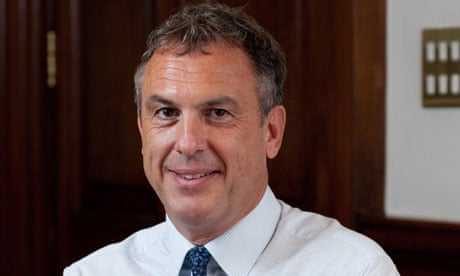It's apt that Simon Fraser, permanent under-secretary to the Foreign Office, head of the diplomatic service and chair of the FCO board, should have a copy of Henry Kissinger's seminal work, Diplomacy, in his Whitehall office.
A career diplomat, Fraser joined the FCO as head in August 2010 after serving in the British embassies in Baghdad and Damascus, and later working as chief of staff to European trade commissioner Peter Mandelson and as permanent secretary in the Department for Business, Innovation and Skills.
While Fraser sees no distinction between diplomacy and economic policy, dealing with different political masters can throw up particular challenges for civil servants and this is perhaps where a dose of Kissinger's pragmatism could prove useful.
"It can be complicated," acknowledges Fraser. "If you're used to working for and delivering one set of policies and a new government comes in with a different set – some people can find that quite challenging. But the job of a civil servant is to be flexible, give the best advice and above all be loyal to the government of the day. If you can't do that you shouldn't really be a civil servant."
Fraser says he worked closely with Mandelson for several years and is now "very happy" working with William Hague.
Recent disquiet from the FDA union, which represents the most senior civil servants, showed the sometimes strained relationship between senior civil servants and the political leadership. Fraser won't be drawn on individual cases but is clear on what his staff need. "We need to give clear leadership to civil servants and represent them effectively, including in our relationships with ministers. Government works most effectively when there's a relationship of mutual respect between senior civil servants and ministers – it's very important."
He is keen to emphasise the "positive and productive" atmosphere at the top of the FCO and says this works to everyone's collective benefit. Fraser's own leadership style is open, honest and informal and his aim is to direct his energy to encourage aspirations and create an environment where people feel "engaged and able to contribute".
A keen cricket fan, Fraser is one of a small group of permanent secretaries on Twitter (@SimonFraserFCO) and in terms of followers and tweets comes third behind the Home Office's Mark Sedwill and Sir Bob Kerslake at Communities and Local Government and also, of course, head of the civil service.
"There's an image of the Foreign Office being rather closed and perhaps a little old-fashioned in its ways of working," says Fraser. "We do need to engage and make sure we're working in modern ways and being active digitally is part of that. Equally, we need to reach out to audiences and engage with people who have views on international affairs. Twitter, or the Foreign Office on Facebook, are very effective."
A new consular strategy will also be launched entirely online, part of the government's digital by default strategy.
With nearly 270 posts in some 150 countries, and after the government's commission of a review into the workings of civil services overseas, Fraser must be keenly aware of the growing influence of other civil service organisations on the UK. He acknowledges that the world is changing and his organisation must adapt. "I'd like [the FCO] to be a centre for excellence for government ... high performing but flexible and modern in its way of working," he says. "Probably we'll be smaller because the pressures on resources in the civil service will continue but we must be as efficient as we can. The aim is to still be the best diplomatic service in the world."
Being open to outside influences is crucial, he says, but he cautions against being over simplistic in assuming that solutions to difficulties always lie in the private sector.
"There are very many extraordinary strengths in the public sector. We give tremendous contribution and service and we need to respect that and acknowledge it while recognising that all organisations should be on a process of continual improvement."
Fraser says he was inspired by the fall of the Berlin Wall in 1989 and the end of the Cold War – and diplomat Sir Robert Cooper "who taught me how to think about the world". There have been low points, too, including "the process of decision-making in the runup to the invasion of Iraq in 2003 and then the shortcomings in the planning in the aftermath". But Fraser is positive about the job in hand to help the present foreign secretary achieve his vision for the Foreign Office: "a creative and confident organisation that is really achieving outputs and impacts around the world … we've made a lot of progress on that," he says.
Want your say? Email us at public.leaders@theguardian.com.
To get our articles on policy and leadership direct to your inbox, sign up to the Guardian Public Leaders Network now.
Looking for your next role? See our Guardian jobs site for senior executive jobs in government and politics.

Comments (…)
Sign in or create your Guardian account to join the discussion